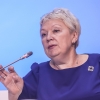There were several sections going on at the forum; the speakers talked about the educator's wages, the role of universities in their region's development, the employment of graduates, introduction of new technologies, and the development of research and innovations. Thus, as a result of the work of the first section, the representatives of Russian universities agreed that universities play an important role not only in society formation, but also in that of sociocultural environment. They've also approved the initiative of creating more affiliated degree chairs in cooperation with enterprises. The professionals believe that this will help in training personnel and improving connections with businesses and the government. They are also sure that it’s necessary to focus on preparing new specialists for military-industrial complex.

"We have to understand that working for the public benefit is one of the universities' essential tasks in the educational field. The university can and should be the integrator of the intercommunion of government, business and society. The key universities are to become the baseline for the sociocultural renovation of the regions. We have to solve several issues for this to work. One of them is the maladjustment of different levels of the educational system. For instance, nowadays universities take an active position towards schools, but we need to simplify this cooperation, so that it does not in any way look like inappropriate spending of funds. The further training system is a sensitive issue: the only criteria for it is the cost of the service. As a result, we get low quality, and everyone loses. The positive moment is that everyone agreed on such measure as including the heads of regions into the supervisory committees", - underlined Eduard Galaginskii, rector of the Tomsk State University.
Vasliliy Tretyakov, vice-provost for educational technologies and environmental monitoring of Ural Federal University talked about introduction of new technologies into the system of higher education. The expert explained that only renovating the curriculum is just not enough: we should aim to introduce smart technologies into educational processes. They are necessary for the sufficient training of the graduates: for instance, it’s hard to imagine modern training for students of medical or shipbuilding universities without the use of simulators. It's good for employers as well, so they too should be involved in the process. The universities should scale their best cases of cooperation with companies. What's more, traditional approaches to the curriculum have to be revised as new technologies appear.
"We all see the growing popularity of online courses: tens of millions use this new educational format. Employers can share on the in-demand technologies, and then we have to understand how to introduce them into the educational system. It's been a year since the launching of the "Open Education" national platform, and we now possess some relevant experience, - but we've faced the problems and difficulties of using online courses, as well", - explained the representative of Ural Federal University.
Mr. Tretyakov underlined that experts from not only universities, but from employers as well have to be involved in creation of effective online courses. The universities and the authors themselves shall guarantee the quality of educational online products. Olga Vasilieva, the Minister of Education and Science, agreed that the question of quality of online education is most important.

Drawing conclusions for the "Development of research and innovations" section, Artem Yurov, director for the Institute of Physics and Technology of Baltic Federal University spoke about the necessity of comprehension of the stimulus for young talent's influx into science. The good way about it is to train them from their school years, as universities are closer to schools than to academic institutions. It also has to do with the methods of training: young researchers must teach, as well as create new fundamental theories based on new technologies such as big data or neural links. Verified scientific research becomes best basis for textbooks, believes Artem Yurov. He's also noted that innovations would be impossible if the problem with wages for the academic staff is not solved.
"We all remember the president's orders from May where he spoke of competitive wages for educators. Obviously, that won't be possible by using the budget's funds only. The possible method is to introduce stable support for permanent positions in leading research with competitive wages. This shouldn't be related to some particular grant. The institution of permanent positions has to have quite a high entrance threshold: a person who has already accomplished a lot in his field shall be able to pass it", - underlined Mr. Yurov.
According to Andrei Fedyanin, head of Administration of Scientific Policy and Organization of Scientific Research of M. V. Lomonosov Moscow State University, the experts who participated in discussion of scientific accreditation system agreed that the renewed system already works. Thus, the staff of the Highest Accreditation Committee has changed considerably; the number of Thesis Boards has diminished in almost half due to the new requirements. The institution is trusted again, so now the main goal is to raise its efficiency.

"First of all, there's this problem: there are Thesis Boards that function not only in organizations under the Ministry of Education and Science, but in other ministry's organizations as well. If there are no common criteria to their work, that will destroy the system from the inside. These approaches should be based on clear and comprehensive criteria and be common for all. What's more, Thesis Boards have to be opened in the regions, not only in Moscow and Saint Petersburg. All scientists and educators should have equal access to thesis defense", - concluded Andrei Fedyanin.
Olga Vasilieva, the head of the Ministry of Education and Science, concluded that all these propositions will become the basis for statutory regulation on federal level. The Minister added that the work of the participants was extremely meaningful, and added that both she and her ministry are always open for proposals and promising solutions.


